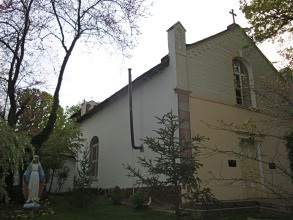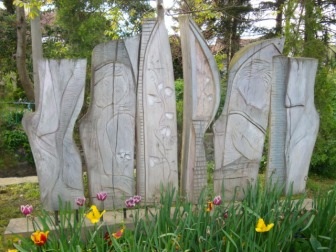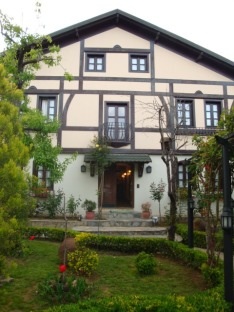“Polish Village” Population: 350
Old name: Adampol
Favourite daughter: Leyla Gençer (opera singer)
Several districts of İstanbul are named after the homelands of people who were forcibly resettled in them. The most interesting – and unexpected – such place is Polonezköy (“Polish Village”), the small village on the outskirts of Beykoz on the Asian side of the city where a group of Poles settled in 1842 after Prince Adam Czartoryski leased land from the city’s Lazarite community to found an agricultural colony for men fleeing compulsory military service in the Russian army.
Backstory
Originally called Adampol after the prince, the village was at first little more than a dot on the map with just a handful of settlers but as time passed political circumstances in Europe conspired to encourage more men to join them. In 1848 an uprising in Hungary was unsuccessful and in 1863 so was another in Poland, both failures resulting in an influx of new colonists.
The immigrant Poles made themselves useful in 1853 when they took the Turkish side in the Crimean War. To reward them, Sultan Abdülmecid I ceded the land to them in perpetuity.
What had once been Poland before being partitioned between Russia, Austria and Hungary regained its independence in 1918. Some of the settlers seem to have considered returning to their birthplaces but most decided that their real home was now in Turkey.
As so often, the new settlers clung to memories of the past, and built their houses from wood and stone in a style more typical of the Carpathian Mountains than contemporary İstanbul. Most made their living as farmers or wood-cutters; some also sold items made from the skin of wild boars. When Atatürk came to visit the new “Polonezköy” he found a thriving settlement that was already starting to make a living out of tourism as word spread of its “otherness”. Early visitors included Gustav Flaubert, Franz Liszt and Pierre Loti who were all keen to see this piece of Central Europe transposed to the Ottoman Empire.
 But slowly Polonezköy started to lose its identity as the law forbidding non-Poles to buy land there was relaxed and Turks started to move in. Out of a population of around 800 people in 2011, only about 50 still had Polish ancestry and even fewer still spoke the language fluently. Nevertheless the village continues to attract the attention of eminent Poles; visitors have included ex-presidents Lech Walesa who came in 1994, and Aleksander Kwesniewski who visited in 1996 and again in 2000.
But slowly Polonezköy started to lose its identity as the law forbidding non-Poles to buy land there was relaxed and Turks started to move in. Out of a population of around 800 people in 2011, only about 50 still had Polish ancestry and even fewer still spoke the language fluently. Nevertheless the village continues to attract the attention of eminent Poles; visitors have included ex-presidents Lech Walesa who came in 1994, and Aleksander Kwesniewski who visited in 1996 and again in 2000.
Today’s Polonezköy still keeps itself to itself and is that unusual thing in Turkey – a village with no bus services. Lost amid the lovely deciduous woodlands that still ring this part of İstanbul, it retains the feel of a real village and the main street is still dotted with wooden houses, most of them pressed into the service of tourism as hotels or restaurants. Unfortunately, though, you only have to stray a little way away from the main road to find that the newcomers who have jumped on the tourism bandwagon have mainly turned their back on the Polish wood-and-stone eco-style in favour of the usual concrete boxes.
Around the village
Polonezköy is a great place to come for a relaxing weekend break, with few must-see attractions to disturb your rest.
The village church is worth a quick look especially for a memorial to the poet Adam Mickiewicz who died in Tarlabaşı in 1869. There is also a small wooden cottage, Zofia Rize Anı Evi, half-buried amid thick undergrowth, which opens on Sundays to give the curious a glimpse of how life was lived here in the 19th century.
More active visitors can step out on a 5km walking trail which zips around the village.
Traditionally a Cherry Festival is held here every June. I have never been to it so can’t vouch for whether it’s worth a visit. 
Eating
Centrepiece of the village is one of those restaurants whose reputation runs ahead of it. Leonardo’s (tel: 0216-432 3082) sits in extensive grounds with a sizeable outdoor pool. Popular with wedding parties, it’s one of those increasingly rare places where pork still features on the menu. Also listed are a number of Polish dishes, some of them of doubtful authenticity. Polonaise-style Peking duck, anyone? At weekends brunching is a big deal although at TL580 a head they’re hardly cheap.
Sleeping
Best of the village hotels is probably the Polka Hotel (Tel: 0216-432 3220) which was created out of an old farmhouse and then expanded down the hillside to include a restaurant with the air of a British pub and a small swimming pool. Rooms are unexceptional, but the rural ambience should more than compensate, especially if you come with a loved one or a group of friends.
 Polka Country HotelIf you don’t want to stay in Polonezköy itself there are a couple of hotels buried in the surrounding countryside which are also worth considering.
Polka Country HotelIf you don’t want to stay in Polonezköy itself there are a couple of hotels buried in the surrounding countryside which are also worth considering.
Closest is the Village Park Resort & Spa (Tel: 0216-434 5656) which has enormous and city-stylish rooms in extensive grounds incorporating a stream and a K-9 dog training centre where some of the dogs used to guard the Metro are put through their paces.
Transport info
Astonishingly, no buses come to Polonezköy. You’ll either have to come in your own car or pay for a taxi from Beykoz.

